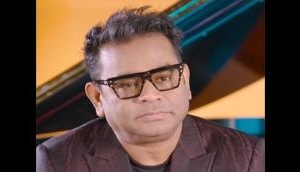Year of taboo topics: Mainstream Bollywood took some commendable risks in 2016

A homosexual man deals with his dysfunctional family over his own needs, a young woman approaches a shrink just to get her life sorted, three women win a case against sexual assault despite being inebriated, and four people grapple with the percolation of drugs in their lives.
These are the simplified synopses of four completely commercial films, with big banners, big budgets, and even bigger stars supporting them. Kapoor and Sons, Dear Zindagi, Pink and Udta Punjab, respectively, are not films that would appear in any other list together, for they're not all brilliant cinema.
But there's one common strand: they all broached taboo topics.
This is not to say that 2016 lacked good cinema outside the mainstream, or to say that there's been no experimental big-budget Bollywood film before. But one needs to acknowledge a good year of cinema, especially one where thought-provoking films managed to provoke that thought with nuance and subtlety.
Dear Zindagi
Weakest of the lot, the mere mention of this film would have many ask why. Gauri Shinde's Dear Zindagi was replete with privilege, unusually quick resolution of lifelong problems, and, most annoyingly, with an unhealthy dose of SRKesque gyaan under the garb of therapy. But in a Bollywood OBSESSED with showing parents as pristine, god-like creatures who grace our planet only to bless us benignly, Dear Zindagi was an absolute breath of fresh air.
Kaira's (Alia Bhatt) bitter feelings towards her parents increase with the passage of time, her bottled-up grievances, though over-simplistically shown as cause for commitment phobia, come out in avoidance. She cannot imagine 10-minute conversations with her folks on the phone, let alone living with them.
Dear Zindagi doesn't judge her or her parents for not being the perfect family that sticks it out for each other. Instead, it categorically tells us parents are human and, therefore, they err. A lesson relevant to just about any family dealing with interpersonal conflict of egos, interests, and aspirations. Which, essentially, is every family.
Pink
Just about every second person I met was blown away by Deepak Sehgal's (Amitabh Bachchan) declaration that 'No means no' after this film. If this shocking tone of surprise doesn't make it obvious that consent is a taboo topic in India, I'm not sure what does.
Aniruddha Roy Chowdhury's Pink, Bachchan's theatrics aside, was a supremely relevant film for having raised the question of consent, especially for prostitutes and married women. That it established that it's never the victim's fault is one thing, but it managed to stretch the debate to spaces where it's assumed that the woman is the man's property for having accepted money, or for having been shipped with dowry.
Also read -
Pink values the word 'No': Opening up the consent debate in India
Pink delved into body politics through its three leading actresses. Minal (Taapsee Pannu) refuses to be victim shamed for her tattoos and friendly disposition, Andrea (Andrea Tariang) won't allow her 'northeast' tag to come in the way of getting justice, and Falak (Kirti Kulhari) finds herself breaking out of her patriarchal existence, just to make the central point - that everyone has the right to consent.
Udta Punjab
Abhishek Chaubey's Udta Punjab courted controversy more than any other film this year. And thanks to that, it had people flocking to the theatres curious about the CBFC's (also known as the 'Censor' Board) concerns.
The truth remains that we'd rather delete references to a real problem plaguing the state of Punjab than deal with it, for the drug menace isn't leaving the state anytime soon.
Also read - Is Nihalani crazy? Udta Punjab is the anti-drug PSA this country needs
The CBFC's attempt at censoring a film that uncovered the blatant denial the authorities live in about Punjab's drug crisis was a real moment of irony. The taboo nature of our understanding of hard drugs was exemplified by the CBFC's attempts, making Udta Punjab that much more relevant.
There are four poignant characters whose lives, at different points, intersect in the film. There's Honey Singh-styled Tommy Singh (Shahid Kapoor) living a drug-fuelled life on stage; unnamed Bihari migrant (Alia Bhatt) who finds herself in a hell hole, raped and abused with drugs; lenient cop Sartaj Singh (Diljit Dosanjh) who takes on the drug menace after losing his brother to it; and doctor Preet Sahni (Kareena Kapoor) who has, over time, lost faith in the system.
They all learn, the hard way, that there's only one way to successful deaddiction - one's own will power.
Kapoor and Sons
The trailers, songs, and just about all the promotional material for this film made it look like a family drama that would eventually find its way back to the Karan Johar stereotypes.
Except it didn't. Shakun Batra's Kapoor and Sons broke a whole bunch of stereotypes with unprecedented subtlety. Despite being a Johar production, the man who butchered representation of homosexuality through Dostana, the film managed to do justice to Rahul Kapoor's (Fawad Khan) struggle in coming out to his family as gay.
As noted in a previous article: "The [Kapoor] family does not seem to realise that Rahul's visit means more to him than just a trip planned around his 90-year-old grandfather. They seem to have no idea of his conundrum as he mulls over how best to come out to them. But is his personal turmoil more significant than the problems the other members face? The film doesn't judge.
"And that's the beauty of it. Kapoor and Sons normalises homosexuality by portraying Rahul's character to be just as troubled as everyone else's in the film."
Also read - That unusual thing about Fawad Khan's gay character in Kapoor and Sons
Of all the films in this list, Kapoor and Sons, arguably handles the most sensitive of all taboo topics: homosexuality.
In an increasingly jingoistic, Islamophobic, homophobic country that doesn't accept anything beyond the heteronormative right-wing patriarchal as the ideal, this film had a Pakistani playing a gay man. That too with sensitivity. We're not sure when we'll get to see that next.
First published: 24 December 2016, 9:06 IST






![BJP's Kapil Mishra recreates Shankar Mahadevan’s ‘Breathless’ song to highlight Delhi pollution [WATCH] BJP's Kapil Mishra recreates Shankar Mahadevan’s ‘Breathless’ song to highlight Delhi pollution [WATCH]](https://images.catchnews.com/upload/2022/11/03/kapil-mishra_240884_300x172.png)

![Anupam Kher shares pictures of his toned body on 67th birthday [MUST SEE] Anupam Kher shares pictures of his toned body on 67th birthday [MUST SEE]](https://images.catchnews.com/upload/2022/03/07/Anupam_kher_231145_300x172.jpg)






